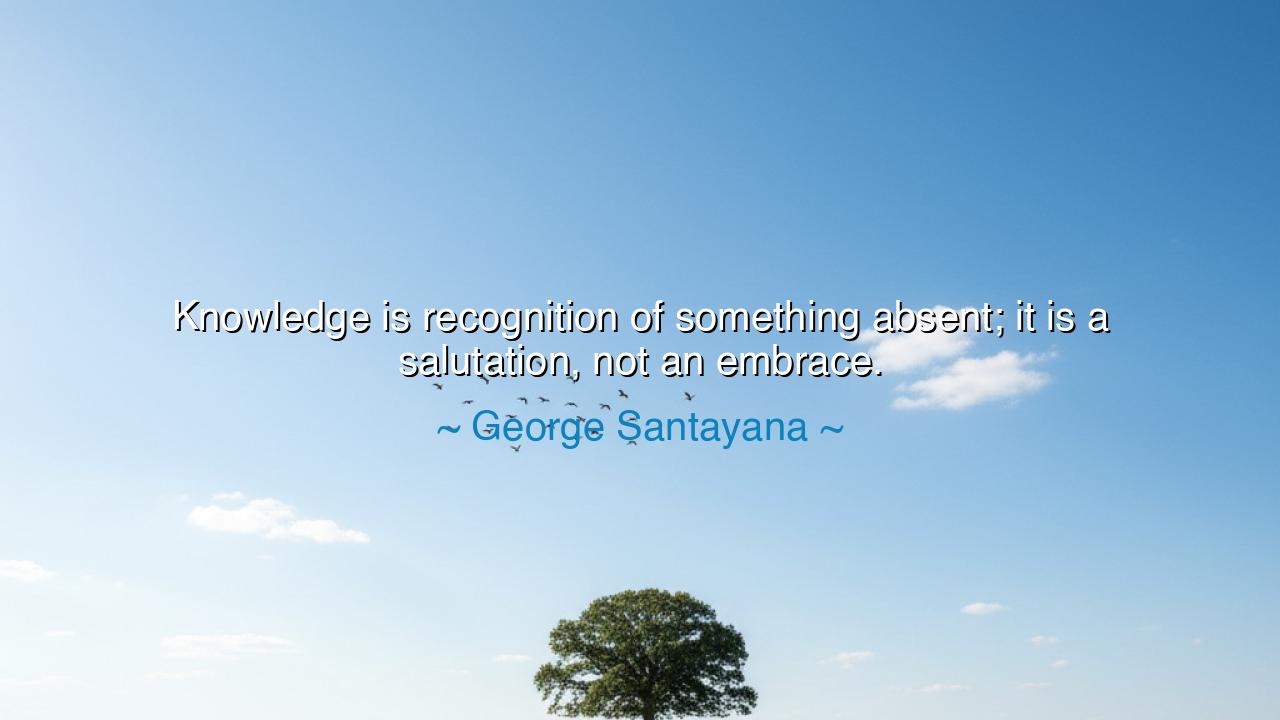
Knowledge is recognition of something absent; it is a salutation






The philosopher George Santayana, a thinker of profound subtlety and poetic insight, once declared: “Knowledge is recognition of something absent; it is a salutation, not an embrace.” These words are not easily grasped by the hurried mind, for they speak of a truth hidden beneath the surface of ordinary thought. In them, Santayana reminds us that knowledge is not possession, but distance; not the full grasping of reality, but the awareness of its mystery. To know a thing is to stand before it in reverence, acknowledging its form without fully holding its essence.
In the ancient world, philosophers sought to pierce the veil between appearance and being. They knew, as Santayana did, that knowledge begins not in ownership but in humility. When he says that knowledge is “recognition of something absent,” he means that to know is to perceive the echo of truth, not its entirety. The mind recognizes patterns, principles, and meanings—but the fullness of reality remains beyond the grasp of intellect. We salute the truth, as one salutes the sun at dawn, knowing we cannot seize it with our hands. The salutation is an act of honor, of admiration, of acknowledgment that the thing known exists in its own right, untouched by our understanding.
Santayana’s vision draws from the wisdom of both Plato and the mystics. Plato taught that every perception of beauty is but a shadow of the eternal form of Beauty itself. We recognize beauty, but we cannot embrace it completely; it lives in a realm higher than our own. Likewise, the mystics of every age—whether in the temples of Egypt or the monasteries of the East—understood that divine knowledge cannot be possessed, only revered. The closer one comes to truth, the more one sees its vastness and feels the smallness of human reach. Thus, knowledge becomes an act of worship—a salutation of the infinite.
Consider the story of Leonardo da Vinci, the man who sought to know all things. He studied anatomy, painting, mathematics, and flight, believing that through reason he might uncover the very mind of God. Yet in his old age, Leonardo lamented, “I have offended God and mankind because my work did not reach the quality it should have.” He saw, at last, what Santayana meant: that no matter how much we learn, the truth remains greater than the learner. Leonardo had recognized the divine order of nature—but he could not embrace it, for it was beyond the touch of mortal hands. His knowledge, immense as it was, remained a reverent salutation to mystery.
This insight humbles the proud and comforts the wise. For in an age that worships information and mastery, Santayana whispers a deeper truth: that knowledge without reverence becomes arrogance, while knowledge with humility becomes wisdom. To “salute” truth is to recognize our place within creation—not as conquerors of understanding, but as participants in its eternal unfolding. The wise do not clutch at the world; they bow before it. They know that what can be measured is not all that exists, and what can be spoken is not all that is true.
The origin of Santayana’s thought lies in his unique blending of philosophy and poetry. A Spaniard who lived much of his life in America and Europe, he stood between cultures and ideas, much as knowledge itself stands between presence and absence. To him, intellect was not the final goal but a bridge—a way for the soul to greet the eternal while still walking among the temporal. His words are not meant to discourage inquiry, but to ennoble it, to remind us that all study, all learning, should be approached with awe.
O seeker of truth, take this lesson to heart: Do not seek to own knowledge; seek to honor it. Learn deeply, but with the humility of one who knows that truth forever transcends the mind that beholds it. When you study the stars, the sciences, or the sacred texts, remember that your knowing is but a reflection of the divine flame, not the flame itself. Let your pursuit of understanding be like a prayer—an offering of attention, not an act of possession.
For in the end, the greatest wisdom is not to say, “I have understood,” but to say, “I have seen, and I revere.” Knowledge is the soul’s outstretched hand toward the eternal, its gentle salutation to what lies beyond. Embrace not the illusion of mastery, but the joy of wonder; for in that humility, the spirit finds its highest truth, and in that reverent greeting, it touches the edge of the infinite.






AAdministratorAdministrator
Welcome, honored guests. Please leave a comment, we will respond soon